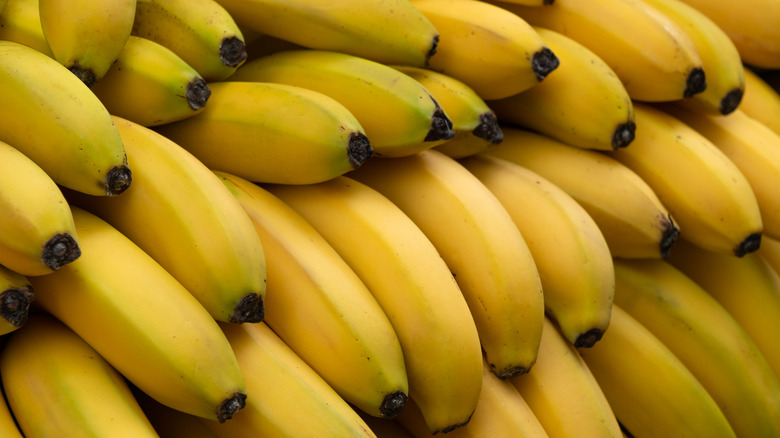Why You Never Find Seeds In Bananas
If you were to peel a banana and find large seeds in it, you'd probably be freaked out. And yet, seedless bananas are what's actually freaky, since they aren't nature's doing. The entire function of a fruit is to get animals to spread the seeds; so a seedless fruit is a useless fruit. But humans changed the equation roughly 12,000 years ago when we realized that domesticating plants and animals provided more stable food sources than hunting and gathering. Eventually, we also figured out that we could cross-breed plants so they would have the ideal qualities that we wanted. For bananas, this meant slowly phasing out the large seeds that made eating the flesh inconvenient.
Humans have been domesticating bananas for about 7,000 years, so we've had a long time to craft bananas that look and taste "better" than they do in nature. Over time, the fruit become a staple food for communities all over the world, even in places where they don't grow naturally. We got so used to their availability that there was a time when home cooks made mock bananas during World War II. While a world without bananas is simply unthinkable for many, it could soon become a reality.
The problem with seedless bananas
The seedless bananas you find at the grocery store aren't able to reproduce. Instead, they're cloned by cutting off a part of the tree and planting it. The resulting tree is genetically identical to the original tree, which is why it's considered a clone. This method provides consistency and control, but because of this, every individual is vulnerable. Diversity is key to the survival of a species and we've basically bio-engineered bananas to be homogenous. If a disease strikes, it could wipe out the entire population of clones; just like the Gros Michel banana was destroyed in the 1950s. The banana that we typically eat today is called the Cavendish and it's equally susceptible to being decimated by disease.
So, what can we do? Not a whole lot, except perhaps to consider making wild bananas part of our pantry. While there would still be certain things to look out for when picking out bananas, this could be another one of those banana hang ups to get over for the benefit of our tables. Sure, it may mean taking out seeds before eating, but it's a small price to pay to ensure that bananas survive.

